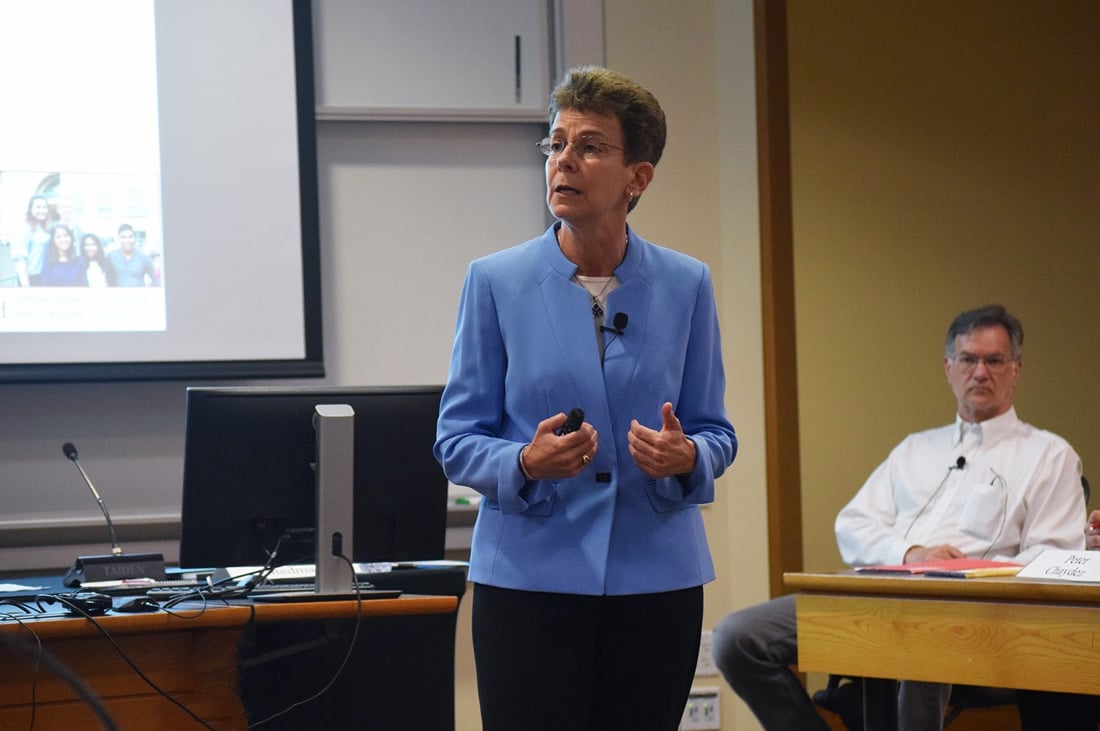In Thursday’s Faculty Senate, Provost Persis Drell summarized the financial position of the University’s endowment and a controversial recent decision to turn down a request from the campus publishing house, Stanford University Press, for additional funds. The Senate later deliberated over the state of graduate student education and affordability.
Budget constraints
“The incremental payout on the endowment is 2.1 percent this year, which is below anticipated cost rise,” said Drell, adding that she would be speaking in more depth about the causes of the lower return at the May 19 Senate meeting.
According to Drell, this makes the budget the tightest it has been since the financial downturn in 2009.
Just three years ago, the budget group granted the Press a similar request for 1.7 million dollars per year for three years, paid out in “one time funds” without future commitments.
“The assurance from the Press was that this would be a bridge to a more self-sustaining future,” said Drell.
With this in mind, the Press recently requested an average of 1.7 million dollars per year in one time funds for the next five years. As a result of the ongoing request for one time funds, Drell concluded that what the Press really needed was not more one time funds but rather an increase of its base fund into the future.
“Last week I met with the chairs of the social sciences and humanities [departments] to let them know that we could not provide additional funds requested by the Press,” said Drell.
As a result, the Press director, Alan Harvey, is currently considering possible routes to a more sustainable revenue model.
Not all of the faculty agreed with Drell and the budget group’s conclusion. Comparative literature professor David Palumbo-Liu argued that the value of a Stanford-branded publishing company could not be reduced to a mere dollar sign.
“At stake is our intellectual identity,” said Palumbo-Liu. “University presses perform both an institutional and public good. They are not judged by an economic calculus, but by an intellectual value, and the value to the intellectual mind and the reputation of a University.”
Other faculty members echoed Palumbo-Liu and emphasized that the Press represented a pipeline for talented professors to gain tenure, reflecting upon the significance the Press had played in their own lives as younger authors.
Graduate affordability
The Senate also considered a presentation on the state of graduate affairs delivered by Patricia Gumport, Vice Provost for Graduate Education and Postdoctoral Affairs.
Gumport began by describing her previous 13 years working to develop graduate program policies as a “source of joy.” Looking back on a study published in 2004, Gumport reminded the audience what overarching goals she and fellow faculty had set for graduate education then that still remain true today.
“One is to build on our strengths and affirm our commitment to our dedicated faculty across the seven schools,” Gumport said. “The second is to take a university-wide perspective in addressing the systemic issues related to academic innovation and collaborative problem solving.”
One of the systemic problems she still identifies today is not taking a holistic understanding of graduate students — “These are real people,” Gumport said.
Graduate students experience depression and anxiety at six times the rate of the general population, Gumport mentioned.
A study produced by Paul Barreira, director of Harvard’s University Health Service, found that “the prevalence of depression and anxiety symptoms among economics Ph.D. students is comparable to the prevalence found in incarcerated populations.”
Gumport believes that there is a space for faculty to positively impact the environment of graduate students, which could potentially address some mental health difficulties.
“[Graduate students] also report faculty advising relationships where they are unclear of the expectations, lack timely feedback and feel a power imbalance that can really affect their self esteem,” Gumport explained.
Although Gumport recognized that these issues are nuanced and are not simple to solve, she believes that one step in the right direction would be to introduce a new type of graduate advisor, a Faculty Director of Graduate Students, who would assist graduate students in adjusting to their studies and responsibilities.
Her proposal for the new graduate advisor was supported by a unanimous vote from the Senate.
Gumport also addressed the rising costs imposed on graduate students and the faculty funding them. It now costs faculty an average of $730,000 to fully fund a Ph.D. student for the estimated six years it takes them to graduate, according to Gumport.
On top of that cost, the current system for accepting graduate students is largely decentralized with departments often accepting as many grad students as they can fund. Funding varies significantly from program to program based on their different budgets constraints.
“We have a lot of departmental autonomy” said philosophy professor Kenneth Taylor.“But if you are looking at it as a graduate student, you see [departmental] inequity.”
Gumport acknowledged Kenneth’s concern and left the faculty Senate with a mandate — “We have to tackle this together. We need to go back and talk with our colleagues about this,” Gumport said.
Contact Paxton Scott at paxtonsc ‘at’ stanford.edu.
